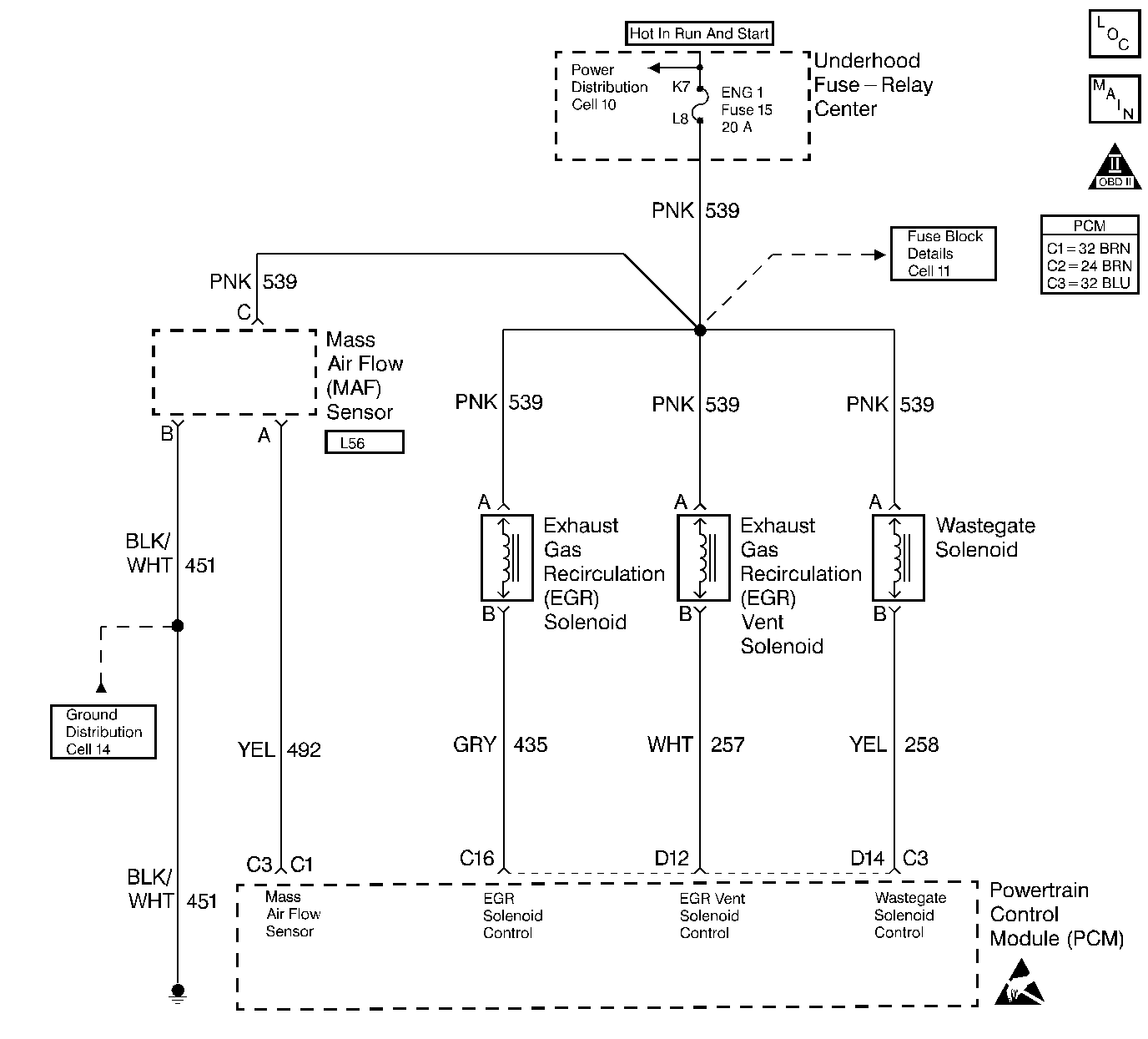
Circuit Description
The EGR flow is controlled by the vacuum actuated EGR valve. The EGR pulse width modulated solenoid meters the vacuum level at the EGR valve actuator as commanded by the PCM. When the PCM is commanding the EGR solenoid ON, the voltage potential of the circuit will be low (near 0 volts). When the PCM is commanding the EGR solenoid OFF, the voltage potential of the circuit will be high (near battery voltage). The primary function of the PCM in this circuit is to supply the ground for the EGR solenoid.
Conditions for Running the DTC
The ignition switch in the ON position.
Conditions for Setting the DTC
| • | The voltage on the EGR solenoid control circuit is high (near battery voltage) when the EGR vent is requested ON. |
| or |
| • | The voltage on the EGR solenoid control circuit is low (near 0 volts) when the EGR vent is requested OFF. |
Action Taken When the DTC Sets
| • | The PCM illuminates the malfunction indicator lamp (MIL) on the second consecutive drive trip the diagnostic runs and fails. |
| • | The PCM records the operating conditions at the time the diagnostic fails. The first time the diagnostic fails, the Failure Records store this information. If the diagnostic reports a failure on the second consecutive drive trip, the Freeze Frame records the operating conditions at the time of failure and updates the Failure Records. |
Conditions for Clearing the MIL/DTC
| • | The PCM will turn the MIL off after three consecutive trips without a fault condition. |
| • | A History DTC clears after forty consecutive warm-up cycles, if this or any other emission related diagnostic does not report any failures |
| • | The use of a scan tool. |
Diagnostic Aids
The scan tool has a 5 second ON time abort. The EGR solenoid can be commanded ON for as many times as needed, in 5 second intervals. It's possible other EGR DTCs may set along with DTC P1655. This diagnostic can be checked at key up. A quick operational check can be made by commanding the EGR solenoid ON and OFF with the scan tool while monitoring Actual EGR. Actual EGR will display Baro (approximately) when the EGR solenoid is OFF. Full EGR will be achieved when the EGR solenoid is commanded ON with the scan tool.
The Adaptive Learn Matrix (ALM) is used to adjust the EGR vacuum control based on mass air flow (MAF). The ALM may change as a result of back pressure increases over the life of the vehicle or other engine system variations. The ALM is made up of sixteen cells (numbered from zero to fifteen) in which each cell covers a range of engine speed (RPM) and load (mm3).
An intermittent may be caused by the following:
| • | Poor connections. |
| • | Rubbed through wire insulation. |
| • | Broken wire inside the insulation. |
Test Description
Number(s) below refer to the step number(s) on the Diagnostic Table.
-
Checks that both the ON and OFF states are commanded. Repeat the commands as many times as necessary. This Step will determine if this DTC is a current or intermittent.
-
This check can detect a partially shorted coil which would cause excessive current flow. Leaving the circuit energized for 2 minutes allows the coil to warm up. When warm, the coil may open (amps drop to zero), or short (amp draw greater than 0.75A).
-
Listen for an audible click when the solenoid operates. This step checks the ignition feed circuit for an open.
Step | Action | Value(s) | Yes | No |
|---|---|---|---|---|
1 |
Important: Before clearing any DTCs, use the scan tool Capture Info to save freeze frame and failure records for reference, as the scan tool loses data when using the Clear Info function. Was the Powertrain On-Board Diagnostic (OBD) System Check performed? | -- | ||
Does the Actual EGR respond to the scan tool commands? | -- | |||
Is the current draw less than the specified value, but not zero? | 0.75 A | |||
4 |
Does the DMM display infinite resistance? | -- | ||
5 |
Does the test light turn ON and OFF with each command? | -- | ||
6 |
Is the test light ON? | -- | ||
Does the solenoid operate? | -- | |||
8 | The DTC is intermittent. If no additional DTCs are stored, refer to Diagnostic Aids. If additional DTCs were stored refer the applicable DTC table(s) first. Are any additional DTCs stored? | -- | Go to the Applicable DTC Table | Go to Diagnostic Aids |
9 | Check for a proper connection at the EGR solenoid and replace any terminals as necessary. Did the terminal require replacement? | -- | ||
10 | Repair the EGR solenoid control circuit. Is the action complete? | -- | -- | |
11 | Check for a proper connection at the PCM EGR control circuit. Was a problem found? | -- | ||
12 | Repair the open in the ignition feed circuit. Is the action complete? | -- | -- | |
13 | Replace the EGR solenoid. Refer to Exhaust Gas Recirculation Solenoid Replacement . Is the action complete? | -- | -- | |
14 | Replace the PCM. Important: The new PCM must be programmed. Refer to Powertrain Control Module Replacement/Programming . Is the action complete? | -- | -- | |
15 |
Does the scan tool indicate the diagnostic Passed? | -- | ||
16 | Does the scan tool display any additional undiagnosed DTCs? | -- | Go to the Applicable DTC Table | System OK |
